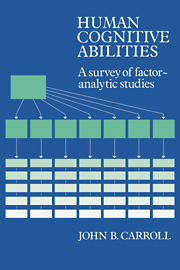Book contents
- Frontmatter
- Contents
- Preface
- PART I INTRODUCTION TO THE SURVEY
- Chapter 1 The Study of Cognitive Abilities
- Chapter 2 Historical Foundations of the Study of Cognitive Abilities
- Chapter 3 Survey and Analysis of Correlational and Factor-Analytic Research on Cognitive Abilities: Methodology
- Chapter 4 Survey and Analysis of Correlational and Factor-Analytic Research on Cognitive Abilities: Overview of Outcomes
- PART II THE IDENTIFICATION AND DESCRIPTION OF COGNITIVE ABILITIES
- PART III ISSUES
- References and List of Datasets
- Appendix A Codes for Countries, Samples, and Factors
- Appendix B Hierarchical Factor Matrix Files
- Name Index
- Subject Index
Chapter 3 - Survey and Analysis of Correlational and Factor-Analytic Research on Cognitive Abilities: Methodology
Published online by Cambridge University Press: 29 September 2009
- Frontmatter
- Contents
- Preface
- PART I INTRODUCTION TO THE SURVEY
- Chapter 1 The Study of Cognitive Abilities
- Chapter 2 Historical Foundations of the Study of Cognitive Abilities
- Chapter 3 Survey and Analysis of Correlational and Factor-Analytic Research on Cognitive Abilities: Methodology
- Chapter 4 Survey and Analysis of Correlational and Factor-Analytic Research on Cognitive Abilities: Overview of Outcomes
- PART II THE IDENTIFICATION AND DESCRIPTION OF COGNITIVE ABILITIES
- PART III ISSUES
- References and List of Datasets
- Appendix A Codes for Countries, Samples, and Factors
- Appendix B Hierarchical Factor Matrix Files
- Name Index
- Subject Index
Summary
The factorial methods are still imperfect but can be developed to become more powerful analytical tools.
L. L. Thurstone (1938b)THE NEED FOR THIS SURVEY
The chief goal of this volume is to present an up-to-date review and critique of the extant literature on the identification, characteristics, and interpretation of cognitive abilities. Much of the literature covered consists of studies using factor analysis, but some attention is also given to studies that did not use factor analysis but presented correlations among pertinent variables, in some cases with further analysis by various techniques such as multiple regression and multidimensional scaling.
Surveys of the correlational and factor-analytic literature on cognitive abilities have appeared periodically over the course of the last 60 years. Spearman's Abilities of Man (1927) considered a limited number of investigations of cognitive abilities; most were appraised in terms of whether they supported Spearman's two-factor theory of intelligence. Next in chronological sequence was Wolfle's (1940) survey of factor analysis to 1940, covering both methodological and substantive progress to that year. In the domain of cognitive factors, Wolfle reported that the factors most generally agreed upon were the verbal, number, space, memory, speed, and reasoning factors, besides, of course, the general factor recognized by Spearman.
Of major importance and influence was a monograph by French (1951) containing a compilation and comparison of the findings from 69 factorial datasets, available at the time, that met certain criteria.
Information
- Type
- Chapter
- Information
- Human Cognitive AbilitiesA Survey of Factor-Analytic Studies, pp. 73 - 114Publisher: Cambridge University PressPrint publication year: 1993
Accessibility standard: Unknown
- 2
- Cited by
